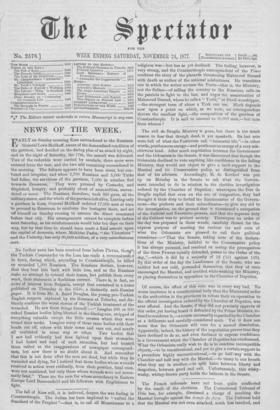The evil de Broglie Ministry is gone, but there is
too much reason to fear that though dead, it yet speaketh. Its last acts were full of what the Positivists call "immortal life,"—in other words, posthumous energy—and posthumous energy of a very mis- chievous kind. After much negotiation between the Government and the Orleanists in the Senate, it was discovered that though the Orleanists declined to vote anything like confidence in the falling Ministry, they would not object to give a tacit support to the Marshal and his Conservative policy, as distinguished from that of his advisers. Accordingly, M. de Kerdrel was put up on Monday in the Senate to ask what the Govern- ment intended to do in relation to the election investigation ordered by the Chamber of Deputies ; whereupon the Due de Broglie replied that even on the eve of resignation, they had thought it their duty to forbid the functionaries of the Govern- ment—the prefects and their subordinates—to give any aid to the investigation, on the ground that it threatened a usurpation of the Judicial and Executive powers, and that the supreme duty of the Cabinet was to protect society. Thereupon an order of the day was proposed in these words, carefully chosen for the express purpose of meeting the curious ins and outs of what the Orleanists are pleased to call their political conscience :—" That the Senate, taking note of the declara- tions of the Ministry, faithful to the Conservative policy it has always pursued, and resolved on seeing the prerogatives of the three Powers equally defended, passes to the Order of the day,"—which it did by a majority of 22 (151 against 129). By this order of the day the Laodiceans of the Senate, who are neither hot nor cold, persuaded themselves that they at once encouraged the Marshal, and avoided whitewashing the Ministry, or placing themselves in opposition to the Chamber of Deputies.






































